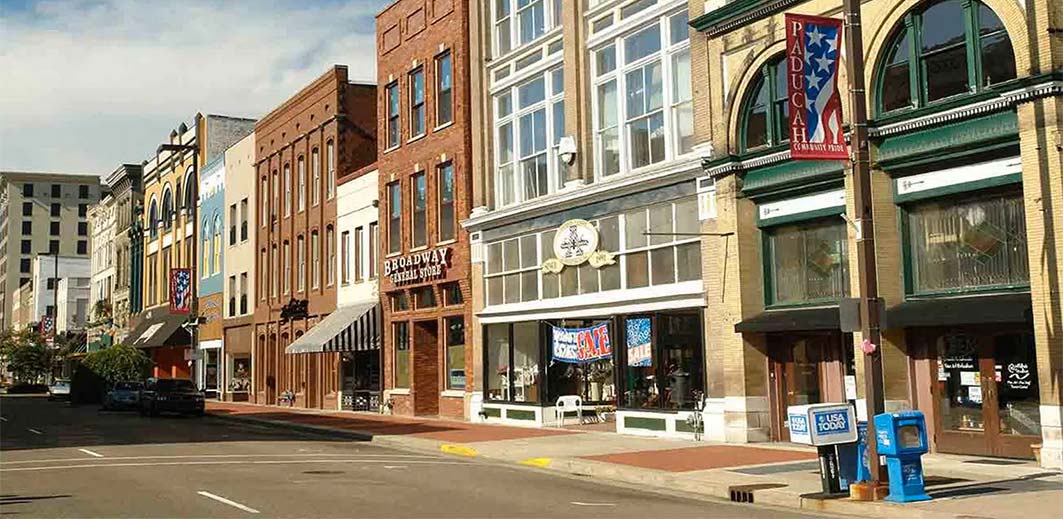The story of Paducah’s city-wide mission to serve its constituents better and make City Hall a better place to do business.
For all of Paducah’s government staff, this last year has been one of change, undertaken by all staff to improve the city they work for and love, aligned around a mission to become the “best city in the world”.
The change began when elected officials and upper-level management wanted to improve Paducah’s reputation for doing business with the city. Improving customer service was a goal of leadership for years, and they decided to shuffle departments to “shake things up.” But the shuffling did not get to the root cause of the problem. The City decided to take an in-depth look at internal processes and how citizens perceive their experience with local government.
How Paducah did it
City leadership brought together a team from various departments to form the Permitting Taskforce, composed of the City Clerk (Lindsay Parish), the Fire Chief, and an Analyst. While pairing Customer Experience with the City Clerk may seem like an unusual move, the City Clerk brings a unique advantage to the role because there’s an opportunity to review legislation before it’s finalized and ensure that the laws that are getting passed are accessible and equitable.
Over eight months, this task force talked to everyone they could, trying to understand the reasons for their current reputation and how they could improve it. The examination showed that the City needed to make three key changes:
- Improve communication
- Increase consistency
- Develop a customer-first culture
Communication
Communication, in particular, was a focal point because communication breakdowns between citizens, city staff, departments, and contractors were causing all kinds of problems. Setting appropriate initial expectations was key, as constituents were often surprised when the process didn’t go smoothly or took significant time, especially after they had made critical decisions or investments.
At the same time, the City was struggling to implement a significant back-end system for staff. Communication between departments was siloed, resulting in an uneven distribution of knowledge and a lack of agreement on how to get the system off the ground.
Leadership hit the pause button on implementation and turned the focus to how Paducah could fix these issues and processes first; technology would only be implemented after the problems were solved. Departments needed to communicate with one another and all be on the same team; there was no “Team Inspection” or “Team Building,” just “Team Paducah”. The group held several meetings to break down the barriers between departments and understand what information each department knew and shared with customers. These meetings were taxing and did lead to a few emotional responses. But the Permitting Taskforce worked to unite everyone by a shared idea–they all work in local government because they care about people. With this shared value in mind, the team was able to uncover some of the communication issues that existed within the City and often caused frustration for customers.
All of this was challenging for the Permitting Taskforce–at times, Lindsay said it “felt like chipping at a brick wall with a toothpick”, and the team questioned whether it was all just too difficult to pull off. At last, a business said that working with Paducah made it easier, not harder, to open up a business. It took several months before getting that first positive feedback, but it showed that the work by the task force was effective and worthwhile.
To continue this upward trajectory, the task force brought all departments into the change process. They established kick-start meetings to help potential applicants with the pre-application process–figuring out which permits they need, calculating fee estimates, etc. so the applicant was empowered with information to decide whether to move forward or not. Later, the team also implemented OpenCounter to help alleviate some of the manual processes they had uncovered as necessary.
Consistency and Culture Change
As the process continued, Lindsay and the team gauged performance against several key milestones. First, the City began distributing surveys to each kick-start meeting participant to examine whether the meeting was helpful and if any communication or knowledge gaps still exist. The City also implemented a general survey that is available to everyone who interacts with the City to better understand their experience. Now whenever they receive multiple complaints about an issue, they formally research best practices around that issue to learn from what other jurisdictions are doing.
Due to the success of the task force, the City has established a Customer Experience department focused on continued improvement in how constituents interact with the City. In the next six to twelve months, Paducah’s Customer Experience team is looking to track data and performance metrics. They understand this is a complicated process to implement and are looking to learn from other cities that have successfully set up data analysis programs. Paducah is looking to the future to make the Customer Experience Department a hub where all customer conversations begin. Leadership is supporting this by giving Team Paducah the tools they need to make local government more understandable and accessible.
Looking forward
OpenCounter is proud to have been a part of Paducah’s Customer Experience journey, and we’re excited to see how the team has grown and look forward to seeing their progress in the coming years. OpenCounter is honored to be a part of helping Paducah transform its reputation and become more business-friendly by improving the customer’s permitting experience and communication between applicants and staff. We’re also thrilled to provide them with actionable data to help make informed decisions and shape future policy that focuses on the customer experience.
To see Paducah’s OpenCounter portals in action, visit their site. We’d also like to give a big thanks to Lindsay Parish for allowing us to tell her team’s story!
